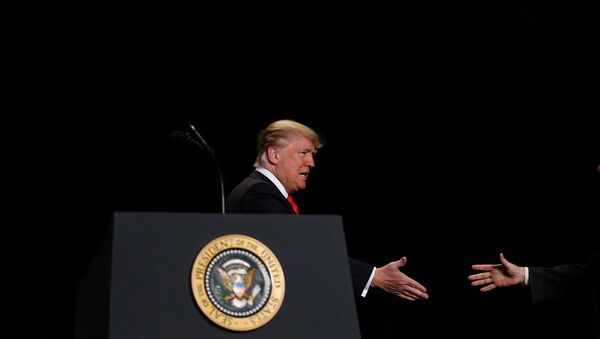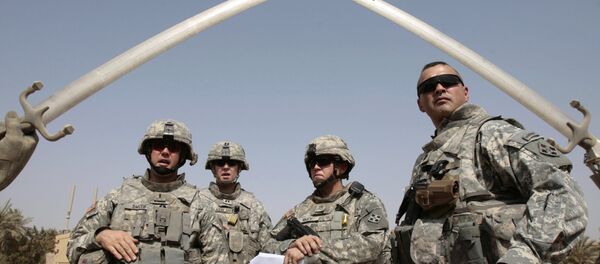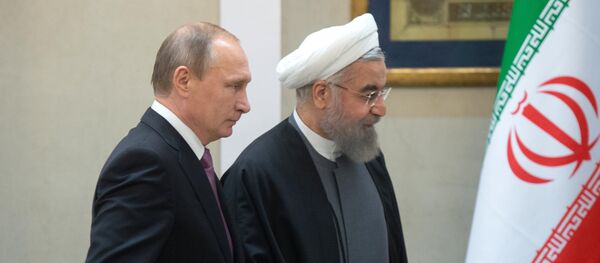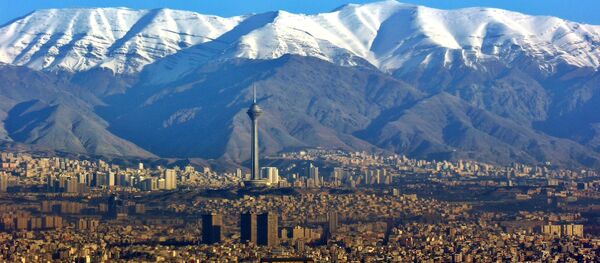In the first part of the interview with Fox News host Bill O’Reilly, which was published on Sunday, Trump said "they [Iran] have total disregard for our country, they’re the number one terrorist state, they’re sending money all over the place and weapons."
The president also revived his criticism of the 2015 nuclear deal between Iran and six world powers which lifted billions in economic sanctions on Tehran in exchange for the country curtailing its nuclear weapons program, calling it "the worst deal he's ever seen negotiated."
On the same very day, the US media reported that the Trump administration was looking to 'drive a wedge' between Russia and Iran in its effort to improve relations with Moscow while confronting Tehran.
Correctly, President Trump's strategy is to drive a wedge between Russia & Iran, where Obama failed miserably. https://t.co/SNr6Onkplu
— Rɪᴄʜᴀʀᴅ Kᴇᴍᴘ (@COLRICHARDKEMP) 7 февраля 2017 г.
Commenting on the above reports, Russian political and military analysts explained to Sputnik why Moscow should not fly into US' arms but defend its ally in the Middle East.
"The logic of the White House is fairly simple: any deterioration of relations whether Russian-Iranian or Russian-Turkish is strengthening the US position in the region," defense analyst, Deputy Director of the Institute of CIS (Commonwealth of Independent States), Lieutenant Colonel Vladimir Evseev explained to Sputnik.
He further elaborated that Washington is interested in weakening Russian-Iranian and Russian-Turkish ties in order to develop stronger positions particularly in Syria.
"There are reports that the Israeli lobby have been rendering support to Donald Trump during his election campaign. Thus he might have certain obligations before the state of Israel under the promises he might have given during his presidential campaign," he told Sputnik.
Hence, the defense analyst suggested, restoring relations with Israel might be one of the most likely foreign policy actions of the new US administration.
The relations between Washington and Jerusalem soured at the end of December when the US refused to veto the UN Security Council resolution condemning Israeli settlements as illegal, but silently supported it by abstaining.
Later, US diplomatic sources admitted that it was a "political decision" made by President Obama.
Vladimir Evseev therefore said that President Trump's anti-Iranian rhetoric is consistent with his negative remarks during the elections campaign about the nuclear deal with Iran, which his Democratic competitor Clinton also spoke against.
"The US can't block this agreement because it is supported by the corresponding resolution of the UN Security Council and is a multipartite deal. However it will try to create conditions so that the deal cannot be implemented," the expert said.
He further noted that the newly imposed US sanctions on Iran tend to support this assumption.
"They could bring a number of unexpected surprises especially with regards to some key issues of the bilateral relations between our two countries," he said.
Meanwhile Vice-President of the International Public Foundation "Experimental Creative Center" Yury Byaly has suggested that the Trump Administration will use political horse-trading in its foreign policy and will repeatedly encourage the Kremlin to buddy up against a third country, be it Iran or China.
At the same time the political analyst does not rule out that the US media reports on the US aim to divide Russia and Iran might be fake news and internal provocation aimed at preventing Trump from normalizing relations with Russia.
"The forces not interested in this normalization could have organized such a 'leak' about an a priori unacceptable variant for Russia thus putting both Moscow and Washington into a deadlock," Byaly told Sputnik.
"Those are different tracks which should not intersect. If the Kremlin succeeds in sticking to such a line of behavior it will be able to continue its mutually beneficial cooperation with Iran, including militarily, without paying any attention to the so-called 'overseas signals'," he said.
Meanwhile Boris Dolgov, a senior fellow at the Moscow-based Center for Arab and Islamic Studies at the Russian Institute of Oriental Studies told Sputnik that Russia needs to persuade the Trump administration that Iran poses no serious threat to it, if Moscow wants to maintain its alliance with Iran.
"Russia has to treat US media reports that Washington wants to "drive a wedge" between Tehran and Moscow seriously. However I think that Russia, on its part, should try to persuade Washington that Iran poses no threat either to it or to its ally Israel," he said.
The political analyst further noted that Iranians have repeatedly stressed that the Palestinian issue remains the core reason for their standoff with Israel and solving it would mean the end of the conflict between the two countries. Until it exists it will only further pump up the aggressive rhetoric," the expert finally stated.
Never miss a story again — sign up to our Telegram channel and we'll keep you up to speed!






